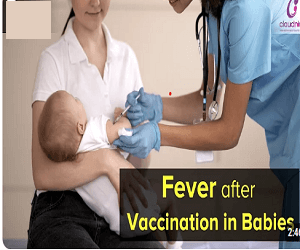Understanding Vaccine-Related Fever in Babies: Causes, Management, and Reassurance
The Normalcy of Vaccine-Induced Fever
As a parent, it’s common to experience a sense of concern when your baby develops a fever after receiving a vaccination. However, it’s important to understand that this is a normathe reaction, rather than a sign of something more serious.
Fever is a common phenomenon observed, particularly after the administration of the DPT (Diphtheria, Pertussis, and Tetanus) vaccine. This is because the vaccine contains antigens that trigger the body’s immune response, leading to the production of antibodies. This immune reaction can result in a temporary increase in body temperature, which is known as vaccine-induced fever.
Understanding the Causes of Vaccine-Related Fever
Vaccine-related fever is not a disease or an infection; it is simply the body’s way of reacting to the vaccine and generating immunity. This process, known as pyrogenesis, occurs when the vaccine components stimulate the body’s immune system to produce more temperature.
While some vaccines, such as the DPT vaccine, may cause more fever than others, this is not a cause for alarm. The body’s reaction to the vaccine is a sign that the immune system is doing its job, working to build protection against the targeted diseases.
Managing Vaccine-Induced Fever
In most cases, the fever associated with vaccines is mild to moderate and can be easily managed with a simple over-the-counter medication, such as paracetamol. This fever typically lasts for a day or two and does not require any further medical intervention.
It’s important to note that if a child experiences a very high fever, exhibits other concerning symptoms, or seems unresponsive, it’s crucial to seek immediate medical attention. These could be signs of a more serious issue that requires prompt evaluation and treatment.
Reassuring Parents: Vaccine Fever vs. Disease Fever
While the prospect of a fever can be worrying for parents, it’s important to remember that the fever associated with vaccines is generally milder and less severe than the fever that could result from the actual diseases the vaccines are designed to prevent.
The fever caused by the vaccine is a sign that the body is mounting an effective immune response, which is ultimately a good thing. It’s a small price to pay to protect your child from the potentially devastating effects of vaccine-preventable diseases.
The Changing Landscape of Vaccine-Induced Fever
With the advancement of vaccine technology and the introduction of newer vaccine formulations, the incidence of severe vaccine-induced fever has decreased in recent years. Many children today do not experience high fevers after vaccination, but it’s still important to be aware that some children may still react with a mild to moderate fever.
For parents with a family history of febrile seizures, there may be a lingering concern about the possibility of their child experiencing a seizure due to the fever. While this is a valid concern, it’s important to remember that the fever associated with vaccines is generally milder and less likely to trigger a seizure than the fever that could result from the actual disease.
Conclusion: Embracing Vaccine-Induced Fever with Confidence
Vaccine-induced fever is a normal response that demonstrates the effectiveness of the vaccine in stimulating the body’s immune system. While it can be unsettling for parents to see their child with a fever, it’s important to remember that this is a temporary and benign reaction that can be easily managed with the right care and support.
By understanding the causes and management of vaccine-related fever, parents can approach their child’s vaccination appointments with confidence, knowing that the temporary discomfort of a mild fever is far outweighed by the long-term protection and health benefits the vaccines provide.
